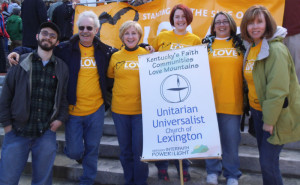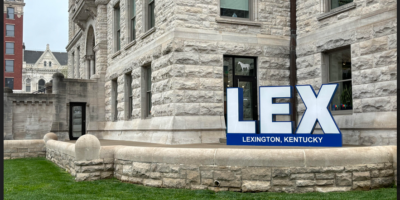Reflections on attending I Love Mountains day

Daniel, the 24 year old, with Unitarian Universalists at I Love Mountains march in Frankfort on February 17. Photo courtesy of
Stacey Stone.
By Joseph G. Anthony
Daniel, my 24 year old, was happy to be a part of the annual Frankfort “I Love Mountains” rally and march organized by the Kentuckians for the Commonwealth. He wasn’t, however, thrilled to be carrying the Methodist sign—(the Methodists had more signs than people). He kept trying to hand it off to me as we paraded up to the capitol steps and settled in for a rally. But I’m a well-lapsed Catholic, current Unitarian-Universalist. I need no other religious affiliation.
The U.U.’s and other faiths were well represented. It was a big, enthusiastic crowd. And the February day kept acting like it was early April. All that coal-induced global warming has its plusses. After the marching, we were ready for speeches.
The first one of the day was the old coal miner guy, Carl Shoupe, who’s a regular at this. He got into a nice rhythm chanting that Congressman Hall, Representative Stumbo, Governor Beshear might love coal (corporations, money, lobbyists,) but they sure as hell didn’t love coal miners, coal families, or—and this is all of us—coal victims.
“I love coal.” You see it on bumper stickers all over the state. What a slogan. That carbonized rock that’s ripping off our mountain-tops, killing our miners, fouling our streams, and choking our air. Who wouldn’t love it? One truck weaving in and out of the crowd kept telling us that 60,000+ Kentuckians did indeed love coal.
Probably. Or maybe they just think they do. I thought I loved Cheryl Clark at one time—one year older than me and truly gorgeous. Maybe I did.
But she didn’t love me.
Now I love Sol.
Carl Shoupe had survived a mining accident about ten months into being a miner. Barely survived it. That was underground. If he had been able to continue the job, he would have had to endure some of the other hazards that go with underground mining. Like the dust. He didn’t breathe enough of it himself to do serious harm but he talked of friends fighting for their breath while simultaneously fighting the coal companies for the money they were promised so that they could continue to fight for their breath.
We all breathed deeply in sympathy. But here’s a problem we in the anti-mountain-top removal crowd have: we don’t want to be seen as anti-miner. We say let’s go back to underground mines. But if I’m honest, I’m not just against mountain-top removal, though that’s what I’m most against.
I’m agin all coal-mining.
I hate coal.
Silas House’s speech fit my mood exactly—the sunshine and the crowd couldn’t keep a note of discouragement out of his voice. The novelist who could imagine Clay’s Quilt, The Coal Tattoo, and Eli the Good was having a hard time imagining that this rally would make a difference. But when he referenced his own discouragement, it was as a warning against depression, against giving up. He detailed a story of visiting his parents in eastern Kentucky and having the house shake with a huge blast. But what shocked him, what saddened him, was how matter-of-fact his parents treated the event, how they and the local newscasters (it was such a big blast it made the news) all were determined to treat the explosion as a non-event, as if the destruction all around them wasn’t happening.
Somebody once said—this was back when New York City seemed to be falling apart—that the worst thing about New Yorkers was their power of adjustment. New Yorkers adjusted to jumping over prostrate homeless people on practically every corner; it was just part of daily life after a while. Having your house shift on its foundations and watching your streams dry up is just part of the coal economy.
You want that cheap electricity, don’t you?
I hate coal. But coal is so big and powerful, it seems futile to fight it, a losing proposition.
But Silas House says we can’t give up though we might want to. Silas said he had to keep fighting –for his daughters. For all the children. For the future. We have to be able to imagine an economy separate from coal where Appalachian “hillbillies” would have both their hills and their culture. Silas, our imaginative novelist, finally helped us imagine that future, too. He urged us further: force our leaders to imagine that life, too.
I should have carried Daniel’s Methodist banner for a while. If Silas can envision such a hopeful future, I can, too. I’d be willing, for a while at least, even to be a Methodist to be able to dream that dream. Wishing won’t make it happen, Silas said. Maybe the thousand or so people in Frankfort won’t make it happen, either. But we have to keep marching. We can’t adjust to what we have gotten used to seeing: the daily destruction of our beautiful state. Martin Luther King said he’d been to the mountain. He didn’t see an open pit when he got there.




Robert Anthony
It may seem a fantastical dream, but it is more realistic than “Clean Coal”.